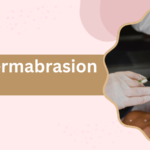
Microdermabrasion facial
March 28, 2024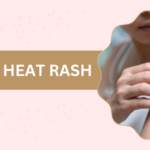
Treating Heat Rash
May 2, 2024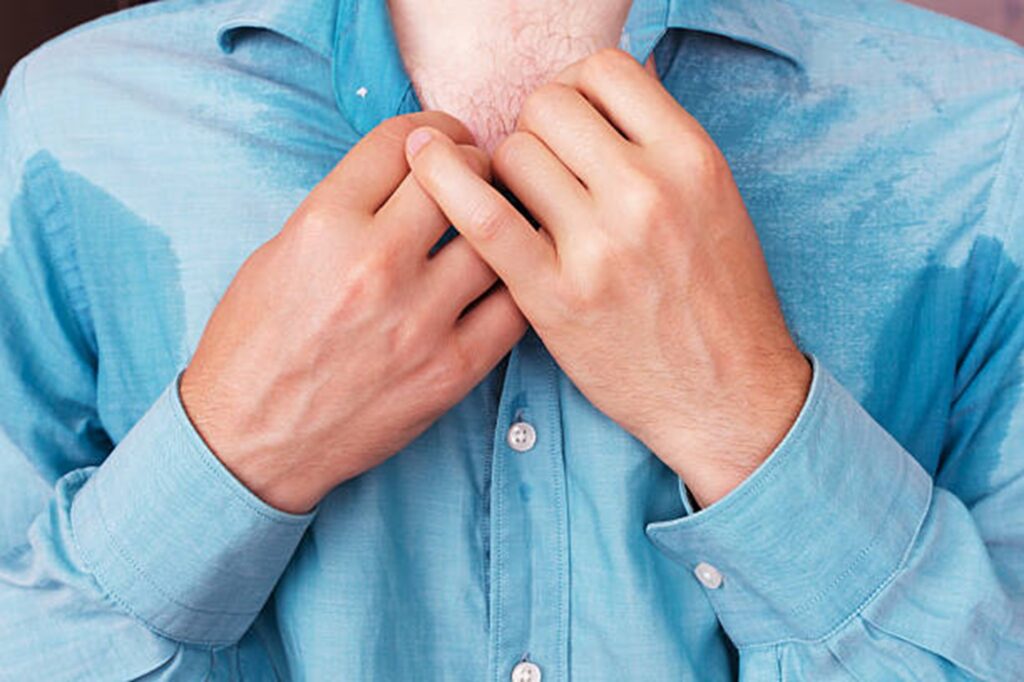
Are you sweating excessively even when not doing any intense activity? A condition known as hyperhidrosis can be the cause of excessive sweating.
It’s a health condition where your body produces an excessive quantity of sweat, going beyond what is needed to control the body temperature. It occurs in different body parts, which may cause social discomfort and interfere with your daily activities.
Dr. Anju Methil, a leading dermatologist in Andheri, Mumbai offers various treatments and procedures to overcome the issue of excessive seating. She has over 28 years of experience in performing cosmetic procedures. She specializes in various surgical and non-surgical skin treatments and is known for providing exceptional results.
In this blog, we will explore the cause of excessive sweating and check out the various treatments available to tackle this issue.
Ready to live without excessive sweating? Explore your options with an expert by booking an appointment today.
Let’s check out the various factors that cause excessive sweating.
Cause of excessive sweating

Primary Hyperhidrosis: Genetic Predisposition
It’s caused by faulty nerve signals that trigger the sweat glands to become overactive. It’s usually genetically inherited and not due to any existing medical condition.
Secondary Hyperhidrosis: Underlying Health Conditions
Conditions such as diabetes, thyroid, and infections can cause excessive sweating. It is essential to find the root cause and treat it.
Hormonal Imbalance
Changes in hormone levels during menopause or teen years can stimulate more sweat production.
Psychological Factors
The body reacts to stress and anxiety by activating the sweat glands resulting in episodes of sweating.
Lifestyle Factors
Caffeine and hot foods can interfere with the body’s sweat control.
People who are overweight may sweat more because they have a higher body mass.
Curious about what steps you can take to fix this problem? Glance below at some treatment options you can opt for.
Treatment options for excessive sweating
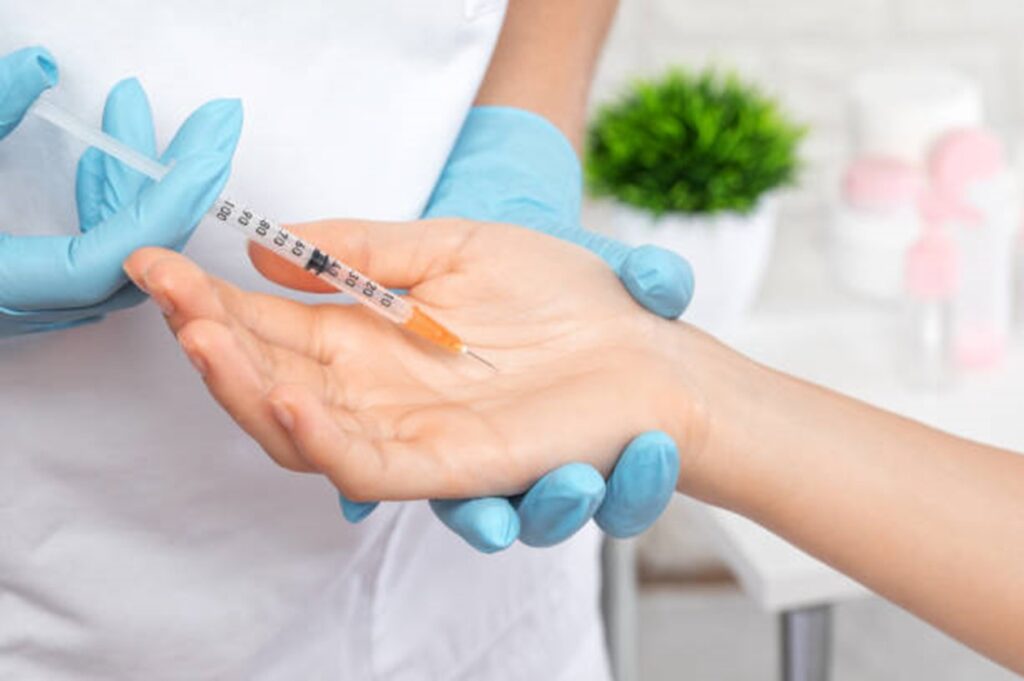
Medications:
They play a crucial role in effectively managing hyperhidrosis. Botulinum Toxin (Botox) Injections. The one that is commonly used nowadays is botox injections, which block the faulty nerve signals that stimulate sweat glands. Ideally used for the underarms area, palms, and feet, Botox can effectively minimize sweating for up to six months.
Prescription Antiperspirant
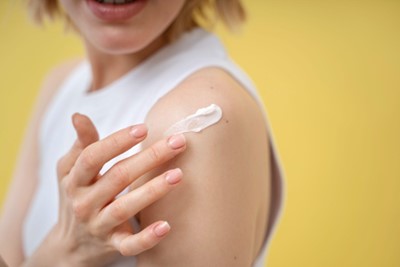
Prescription antiperspirants have more aluminum chloride than over-the-counter versions. They are the best defense against sweating and are easier to get and apply. It comes in the form of a cream that you can apply to your underarms, hands, and feet at night.
Nerve-blocking Medications
Anticholinergic medicines can make you sweat less by stopping a chemical called acetylcholine from signaling your body to produce sweat. These medications might help improve your skin but they may also cause side effects like dry mouth and blurry vision.
Prescription Creams and Wipes
Glycopyrrolate-containing topical creams are specifically applied to the skin in targeted areas to control the body’s sweat. It’s highly effective on facial skin.
Antidepressants
Anti-depressants may not only be used to manage depression but also may reduce sweating. Besides, lowering the anxiety level, they work indirectly on one of the triggers of excessive body sweating.
Surgical Procedures: When Medicines Don’t Work
Iontophoresis
It’s a non-invasive method where a device is used to pass mild electricity through water onto the skin. This reduces sweating in the hands and feet. Multiple sessions can have a lasting solution.
Sweat Gland Removal
In cases of excessive underarm sweating, the glands can be removed using minimally invasive surgery. This offers a permanent solution.
Microwave Therapy
Also called the miraDry system, it uses microwave energy to permanently remove the sweat glands located in the underarms area. This procedure has been FDA-approved and gives a long-lasting solution without the need for invasive surgical procedures.
Laser Therapy
The laser treatment may involve targeting and destroying the sweat glands located in the palms, feet, face, and armpits. This approach represents a less invasive substitute to conventional surgical methods and allows for quicker recovery.
For better insights, book an appointment with the doctor.
Are you wondering how you can prevent excessive body sweating without treatment?
Prevention
Before we dive into the prevention steps, there are some changes you need to make in 3 aspects of your life: diet, lifestyle, and personal hygiene.
Lifestyle Modifications: Small Changes, Great Impact
Choose Appropriate Clothing
- Dr. Anju Methil a prominent dermatologist in Andheri, Mumbai suggests that you choose lighter and more ventilated and moisture-absorbing materials that will let your skin breathe best and sweat less.
- One should wear clothes that are not tight-fitting to minimize friction and heat buildup, thereby helping in body sweat control.
Maintain a Healthy Weight
- Extra body weight can bring forth a rise in body temperature and sweat excretion. Regular exercise and good food are essential. They help with weight management and reducing sweating.
Dietary Adjustments: Select Food Wisely.
Stay Hydrated and Eat Well
- Drinking lots of water is essential to maintain body temperature and reduce the need for excessive body sweating as a cooling mechanism.
- Restrict the consumption of specific foods and drinks that might trigger heavy sweating.
Consuming spicy foods, caffeine, and alcohol will stimulate your sweat glands. Identifying these triggers and cutting down on them can eventually help manage the cause of excessive sweating.
Personal Hygiene Practices:
Regular Showers
- Taking a daily bath with antibacterial soap not only decreases skin bacteria that lead to axillary odor but also removes sweat from the body.
Use Antiperspirant Effectively
- Use of antiperspirant on dry skin before going to bed puts it to work while you are asleep making it more efficient the following day. Switch to prescription-strength antiperspirants if over-the-counter ones fail to help.
Achieve healthy and radiant skin, and book an appointment with the doctor soon.
Conclusion
You don’t have to endure heavy sweating forever. Today, there are many options, from medications to advanced surgery, to treat hyperhidrosis well. One can effectively discover the option that works best for their lifestyle, leading to a comfortable life. If in doubt, you can take the help of Dr. Anju Methil at The Skin and Shape Clinic in Andheri, Mumbai.
If you still have some questions hovering in your mind, do check out the FAQs below.
FAQs
How Much Sweat is Normal?
The amount of sweat each person produces can vary quite a bit. During a heavy workout, it’s not unusual for someone to sweat between 0.8 to 1.4 liters within an hour. For daily activities under normal conditions, the amount would be significantly lower. Remember, sweating is the body’s natural cooling system at work.
What Causes Excessive Sweating of the Head and Face?
When it comes to sweating more than usual from the head and face, it might be due to primary hyperhidrosis, a condition that tends to run in families, or it could signal underlying health issues, reactions to medications, or even stress.
Can Night Sweats be Normal?
Having night sweats now and then can be perfectly normal, especially if your bedroom is warm or you’re bundled up in blankets. However, if you find yourself regularly waking up drenched, it could be a sign that something more significant is going on health-wise. It’s a good idea to discuss persistent night sweats with your doctor.
Does Sweat Help Your Skin?
Sweating does have a bit of a cleansing effect on the skin, helping to flush out dirt and bacteria from your pores. However, letting sweat linger on your skin might not be the best idea, as it can lead to irritation or alleviate existing skin conditions. Keeping your skin clean and promptly washing off sweat after a workout is the best approach to keeping your skin healthy.
References:
https://www.webmd.com/skin-problems-and-treatments/hyperhidrosis-causes-11
